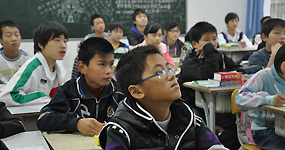
关于东亚的学校教育存在两种成见:一是学生们极其刻苦,二是学习靠死记硬背。但经合组织(OECD)对全球学校教育的最新调查显示,实际情况并没有这么简单。在“国际学生评估项目”(Pisa)调查中,上海名列第一,前五名中还包括其它三个东亚国家或地区。
但经合组织教育司指标与分析部主管安德烈亚斯•施莱歇(Andreas Schleicher)表示,并非所有东亚国家都表现出色。他还说,经合组织评估的是创新思维。上海的学校不是在培养死读书的学生:它们正引导学生将能力和热情转化为优异的成绩。
它们是如何做到这一点的呢?Pisa调查每三年进行一次,考察15周岁学生的数学素养、阅读素养和科学素养,但每次调查所考察的着重点是轮换的。该调查强调的是综合学习能力:例如,读写能力测试中就包括推理能力。在此前于2000年、2003年和2006年进行的三次调查中,芬兰均名列第一。但今年,上海取代芬兰位居首位,韩国位居第二,香港、新加坡分列第四、第五位。今年考察的着重点是阅读素养。(每个国家通常会有数千名学生接受测评;但在中国,调查主要集中在上海。)
那么,为什么上海表现得如此优异呢?经合组织提到了中国的学校改革:该组织对教师们表现出的积极性印象深刻,教师们现在薪酬上涨,受到更好的培训,渴望打造自己的课程。表现糟糕的教师很快就会被他人取代。中国还提高了入学率,走出了填鸭式教学的定式。
最后一点是关键:施莱歇表示,俄罗斯在考察死记硬背能力的评估中表现出色,在Pisa调查中则不然。而中国在考察死记硬背能力和考察综合学习能力的评估中均表现优异。
经合组织还提到了文化因素——中国人希望出人头地的普遍心理,以及来自父母的压力。施莱歇尔说,文化与制度间的相互影响很难理清。假如学校教育出色只是因为学生学习刻苦,那么在有着相似文化的国家应该见到相似的结果。
然而,芬兰在调查中遥遥领先于瑞典,上海胜过台湾,香港胜过澳门。同样,假如学校本身才是唯一重要的因素,那么为何英国学校里的中国移民学生表现也很优秀呢?几乎可以肯定,文化与制度是相得益彰的:以贤举能的制度会刺激学生刻苦学习,反之亦然。
被诸多教育政策制定者视作权威的Pisa调查,能带给我们哪些关于大学教育和就业的启示呢?施莱歇向Beyondbrics表示,来自加拿大的中期数据显示,在Pisa调查中表现优异的学生,极有可能在高等教育和就业市场中也有上佳表现。
不过,这一相关性未必会在中国出现。一方面,一旦学生迈入大学校门,来自父母的压力就会有所缓解。另一方面,中国的大学被控在学位授予方式上存在腐败,这或许削弱了学生刻苦学习的动力。
同时还有一些问题有待解答。首先,就中国学校教育的整体水准而言,上海到底算是特例还是一般例子?在某些国家,大城市的学校教育表现要低于全国平均水平,但在中国似乎不大可能如此,因为其沿海地区要比内陆地区发达。但经合组织确实也考察了部分农村地区,并发现这些地区的学校教育质量与上海不相上下。
其次,如果中国的学校教育如此强大,那么该国是否存在对年轻人过度教育的风险呢?在Pisa调查中位居第二的韩国,拥有令人羡慕的知识型经济,专利申请方面的情况就是例证。但就连该国强大的财阀也无力为所有大学毕业生提供工作,其中一些毕业生只得经过再培训后改行作面包师。
第三,中国学校教育未来成功与否是不是取决于中国经济的变化?如果中国制造业继续建立在低工资基础上,就会有许多学生认为刻苦学习的回报不高,并因此降低学习的积极性。抑或,他们会更加刻苦、更富创造性的学习,以求抢到为数不多的好工作、或者移居海外。
这些问题有待其它调查解答。Pisa调查结果表明的是,中国学生就像中国企业一样不甘落后。译者/汪洋
http://www.ftchinese.com/story/001035939

There are two stereotypes about schooling in east Asia: the students work extremely hard, and the learning is by rote. In fact, things are more complicated, as the OECD’s latest global schools survey has shown.Shanghai came top in the Pisa survey, with three other east Asian territories in the first five.
But not all east Asian countries did well, says the OECD’s Andreas Schleicher, adding that it’s innovative thought that is assessed. Shanghai schools aren’t turning children into walking textbooks: they are channelling their ability and enthusaism into exceptional results.
How?Undertaken every three years, the Pisa survey tests 15-year olds, with a rotating focus on maths, reading and science. The emphasis is on broad learning: literacy tests involve reasoning, for example. In the three previous editions - 2000, 2003 and 2006 - Finland came top. But this year, with the focus on reading, Finland was displaced by Shanghai, with South Korea second, Hong Kong fourth and Singapore fifth. (Thousands of children are normally tested in each country; but in China the survey was centred on Shanghai.)
So why did Shanghai do so well? The OECD points to Chinese school reforms: it was impressed by the initiative shown by teachers, who are now better paid, better trained and keen to mould their own curricula. Poor teachers are speedily replaced. China has also expanded school access, and moved away from learning by rote.
The last point is key: Russia performs well in rote-based assessments, but not in Pisa, says Schleicher, head of the indicators and analysis division at the OECD’s directorate for education. China does well in both rote-based and broader assessments.
The OECD also points to cultural factors - widespread expectations of high performance, and pressure from parents. And it’s the interaction between culture and the system that is hard to untangle, says Schleicher.If schools did well just because of hard work, then countries with similar cultures should see similar results.
But Finland beats Sweden by a distance, Shanghai beats Taiwan, and Hong Kong beats Macau. Equally, if the schools themselves were uniquely important, then why do young Chinese immigrants do so well in UK classrooms? Culture and system almost certainly reinforce each other: with a merit-based system stimulating hard work, and vice-versa.
What can the Pisa survey - recognised as authoritative by many education policymakers - say about universities and employment? Schleicher tells beyondbrics that, according to medium-term data from Canada, students who do well on the Pisa survey are very likely to do well in higher education and the job market.
However, that correlation would not necessarily be repeated in China. For one thing, parental pressure eases once students get to universities. For another, Chinese universities have been accused of corruption in how they award degrees - which may undermine the incentives for hard work.
There are other unanswered questions. Is Shanghai the exception or the rule in Chinese school standards? In some countries, major cities underperform the national average, but that seems less likely in China, given the coast-interior disparities. However, the OECD did look at some rural areas, and found they matched Shanghai’s quality.
Second, if school education is so strong in China, is the country at risk of over-educating its youth? South Korea, second in the Pisa list, has an enviable knowledge economy, for example in terms of patent applications. Yet even the mighty chaebol can’t employ all graduates - leaving some to retrain as bakers (see article).
Third, does the future success of Chinese schools depend on changes in the economy? If Chinese manufacturing continues to revolve around low wages, many students may see less reward - and less incentive - for hard work. Or they make work even harder and more innovatively to grab the few good jobs on offer, or to move overseas.
These are questions for other surveys. What the Pisa results suggest is that, just like Chinese companies, Chinese schoolchildren won’t be pushed to the back of the class.
没有评论:
发表评论